#but i was a dancer first and then an instrumentalist and then a singer and then an actor
Explore tagged Tumblr posts
Note
How goes Bloodfinch! Are you at the stage of writing parts yet? Is there a particular area of writing (dialogue, point of view etc) that's particularly fun with it?
And another hopefully answerable but somewhat generic question (to give you the power of surprise yet if you want it!): what person and tense have you gone for? or have you varied it according to a pattern of your own design?
If there's stuff to say about the process of writing concerning what brings you joy (and not further worldbuilding/plot details necessarily that I'm sure time will reveal) it'd be interesting to hear it!
Also, as a side note, you said you very much identified with the sliding meme of your opinion on your skills varying. Hence, I desire to communicate that I think you're consistently brilliant! I am curious why you feel that way though, as I was shocked it was somewhat widespread (I have days where things don't go so well writing, naturally as consistency isn't quite how it works as an area, but find my faith in my skills is rather solid and veers only between "I'm fine at it I suppose?" to "oh yes, it's an area of skills I've worked on that I'm good at" with more sporadic bursts of "I'm a genius! I'm so great at this!" never reaching more despairing "I'm hopeless, utterly hopeless").
it goes well!!! i'm having fun!!! i'm nearing 2.5k now - i had a longer draft, but had to frog that since i decided to start the story in a different place. i'll probably grab and reuse snippets of it later on though. and the outline is complete!! i'm hoping that it'll be similar to lachrimae in terms of time it'll take me to write, although unlike lachrimae i'll then do at least one round of editing once i have a full draft, plus then i'll need to do like. layouts and get cover art and stuff
finch, the pov character, is a singer, and i'm having a WILD time being able to write a very highly trained singer - her tutor (dulceis) definitely has. some traits in common with. certain singing teachers i've had. just wrote a line about dulceis standing on the opposite side of the room from finch yelling 'WHERE ARE YOUR CONSONANTS I CAN'T FIND THEM' and. yes
it's first person present tense and it'll stick to that - normally i'm a third person present tense writer by default, but i'm going for first person here because a) we are VERY deep inside finch's head and b) that was the best way for me to make clear that despite her calling herself finch, that's not what other people call her
i also just created yet another saint today, the sea-saint, who's associated with the sea (duh) and those who make their living from the ocean (sailors, fishers, etc), AND ALSO rhetoric, poetry, and all of the word-arts. the sea-saint is associated with fluidity (duh), impermanence, but also a certain type of control - navigating uncertainty. there is a story about the sea-saint calming choppy waters just by speaking to them and persuading them to settle. they're represented with a wave, a seashell, or a siren (this tends to be the less positive side of the saint, representing fickleness, hunger, and misleading appearances)
oh and i also just wrote up a little story about the origins of bloodfinches, because i was going to type up my handwritten notes but writing up notes was boring and writing up a story that conveyed the same information was far more interesting - so perhaps i'll post that! in a different post though, so it can just be its own thing instead of being buried in this response
naturally from finch's pov i also get to go wild with the auditory imagery which is fantastic, and i'm also having a great time with introducing original characters - even though i work with very, very, very, very, VERY minor characters in hp fanfiction, so minor that in many cases i am inventing characterization out of wholecloth, people still already have certain impressions about characters' appearances, personalities, and general vibes. that is not at all the case with completely original characters and figuring out how to introduce them and convey impressions of them is SO MUCH FUN i forgot how fun it was
i think that the reason my perception of my own writing tends to swing back and forth wildly is because i associate it with ease. words are flowing? plot details are blooming? everything feels great! but if i am not living up to my own expectations, if trying to write feels like banging my head against a wall, or if a scene isn't coming out the way i imagined it and i don't know what the problem is, or i DO know what the problem is and it's going to be a shitload of work to fix, or if it's not connecting with readers the way i thought it would, then i do have a tendency to spiral
logically, i am a fairly confident writer, but emotionally, i'm of course more inconsistent, and emotions tend to rule the day when it comes to how i'm feeling about my skills at any given moment. fortunately, i'm at least aware of that, and i know that feeling like it's hopeless means a) it's not actually hopeless, my brain just likes to latch onto worst-case scenarios, and b) it is well past time for a break
a central issue here is that i often expect very high levels of productivity from myself, and so then even if i know it's time for a break, i then am fighting a separate battle in which i have to convince my brain not to beat me up over needing Break Time, and it all leads to me staring at the wall wishing i could put my brain in a washing machine
#it's the Tinkerbell Tendency#it might also clarify some things if i add that i've been heavily involved in performing arts#since about age 2#that mentality clings to me#i haven't performed in over a year but it still really shapes you#trying to take care of my brain as a writer is basically opposite from my instincts#there will be some parts of bloodfinch that will draw heavily on personal experience#in fact i'm about to write a scene like that#but i was a dancer first and then an instrumentalist and then a singer and then an actor#developing into a full-fledged musical theater kid in high school#and then specializing in singing in college#that entire space exists in this weird liminal zone between taking care of your body and pushing past its limits#especially with live performance#and i still do treat writing in the same way that i treat performing#they live in the same space in my brain#i love them in the same way#bloodfinch#should i make an inbox tag
6 notes
·
View notes
Text
ੈ✩‧ 🎀🩰 ➛ chan thinks he's subtle as he pines over you





pairing : chan x gn reader
prompt : chan was hopeless when it came to flirting with you. his idea was to post on instagram and wait for you to like the picture and magically realize one day that you're just as much in love with him.
genre : fluff !
felix's ver. | hyunjin's ver. | jeongin's version | lee know's ver. | changbin's version | han's ver.

felix is the first one to notice chan sitting by himself in one corner of their dressing room, brows furrowed and anxiously chewing at his lower lip.
"what's wrong, hyung?" he asks from across the room, successfully capturing everyone's attention.
"nothing." Chan tries to brush it off, but everybody notices the blush creeping up his cheeks.
han giggles, eyeing the phone their leader keeps checking every two minutes. everybody knew what had the idol in such a mood.
you probably hadn't liked the latest selfie he had posted.
Bang Chan was a producer, instrumentalist, singer, dancer, rapper, and leader of one of the biggest 4th gen kpop groups, but when it came to you, he couldn't help himself. the thought of maintaining eye contact with you for longer than a second, much less flirting with you, reduced him into a blushing-stuttering mess. hence, he resorted to the least noticeable option - posting semi thirst traps on their public instagram account, waiting for you to notice the post and like it.
"if you want them to see it, just send it to them." lee know teases.
"I am not waiting for y/n to like my post!"
"I never said I was talking about y/n."
That shuts chan up. he throws a hand over his face, groaning. "I can see that they're online. why wont they just like it?"
jeongin rolls his eyes, pulling out his own phone and sending you a message, which you read giggling.
[ innie ] hey, please do us all a favor and like chan hyung's latest post?
the next minute chan jumps up from his place, a wide smile pulling at his lips.
"They liked the post!"
jeongin really didn't have the heart to tell chan what he had to do.

©lixie-phoria, 2023.
#stray kids#bang chan#stray kids scenarios#stray kids text post#stray kids text#stray kids texts#bang chan fluff#chan fluff#stray kids bang chan#christopher bang#skz bang chan#stray kids chan#chan#stray kids x reader#bang chan x reader#chan x reader#bang chan x you#chan x you#kpop x reader#kpop#stray kids fluff#stray kids x you#stray kids oneshot#skz oneshot#kpop one#jyp
5K notes
·
View notes
Note
okay but do you have any thoughts on nihil like. either pre becoming papa OR before current ghost stuff.
hmm! haven't thought about it a whole lot, but i do have thoughts!
this is pre-Ghost Nihil to me:

ever since i first saw the Dance Macabre and Kiss the Go-Goat music videos, i've always thought of pre-Ghost Nihil as. just some guy from Southern California.
i think he was a normal guy who just really, really, really loved music. Nihil's speech in RHRN seems to align with that idea.
PAPA NIHIL: Life is not always how you scripted it. I am almost 80 years old and I'm dead. But I still am part of it– making the people rock. Look, I always wanted to entertain people and be a part of the night, be a part of the world of magic and wonder. Showbiz. And I am. Even now that I am dead, I can still entertain those people for a brief moment every night. And that is meaningful. RITE HERE RITE NOW (2024)
it makes sense to me. Nihil would've been born in the early 40s (personally i put him at the earliest end of this range, born in 1940), so he grew up in the late 40s and in the 50s when Rock and Roll was first developing and becoming popular, and in the years when television became commonplace in the US. he saw the rise of the first rock stars in his youth and that inspired him. it became his dream.
i don't have any detailed headcanons about his early life. i think he sang / played music in school. and i like the idea of him being a surfer, haha. anyway,
handsome and charismatic, Nihil was always popular with women. he was also a serial heartbreaker. the relationships that didn't end due to cheating ended because his relationships always came second to chasing his dream. this is why he had 3 sons with 3 different women before he turned 24. :/
unfortunately, his inability to commit also extended to his career. Nihil was very talented– a good singer, instrumentalist, dancer, and even a decent actor! but i think he was unsuccessful because he couldn't decide exactly what he wanted to do. he frequently started and abandoned projects, and ended up with as many failed bands as he had failed relationships.
as we know, Nihil fell in love with Sister, joined her cult, and debuted as Papa Nihil in 1969. it was a wild few months.
i think The Ghost Project was Sister's gift to Nihil. she loved him. Ghost was a way for her to give him the opportunity to finally live his dream while also furthering the cult. with her help, he finally found success. well, we know how that ended.
one last observation: in Chapter 2, Nihil said "The bloodline has not been broken for 9 millennium. My father was Papa. His father. His father's father. […]" but he must have learned that after he joined the cult, since he had no idea what was going on when he joined in the Dance Macabre MV. i think he grew up the same way his sons did. (without a dad.)
hooray for generational trauma!
13 notes
·
View notes
Note
baby’s breath, foxglove, painter’s palette, windflower, and dandelion!! <333
hihi! sorry for the late response!!
baby’s breath: 5 things you associate yourself with
answer: the riordanverse, my friends, tumblr (LMAOO), my autism (as it affects ?? effects?? a lot of part of our life), and writing <33
foxglove: what is your favorite color and in what shade?
answer: augh this is a hard one ,, i think i would have to go with lavender because that’s what our old host’s favorite color is so we usually just answer with that djdkkdrk ,, PLUS it is a good color
painter’s palette: are you more of a singer, dancer, painter, or instrumentalist?
answer: definitely painter, i can barely sing and cannot dance or play any instruments for the life of me BSKSKDK
windflower: list 5 of your favorite blogs and explain why i like them
answer: @sleepyjim because i uh mutuals <33 plus find death so cool <333 PLUS u guys r like one of the first blogs that followed us back i believe and it just made us feel like we mattered <3 /p @chickensoup1025 so cool!! literally one of my favorite people fr PLUS she introduced us to tumblr so forever grateful LMAOO @syti-city besties 🙏🙏 @xx0yeet-everything0xx ive said this before but i literally was in such shock when u followed us?? thought u were so cool and shit?? and uh uh @lalallorona besti 🙏🙏 love u 😭😭😭 /p (plus all our other mutuals we just could only chose five shout out to pip and nico 🙏🙏)
dandelion: any special talent that you have?
answer: people say were good at analyzing and stuff?? still cannot comprehend that people like what we have to say buuut
8 notes
·
View notes
Text
(Eurovision 2023 challenge)
Day 4: Most overrated entry of 2023
I hate that I'm having less and less time to write those. At this pace it will be a miracle if I finish before the next May… Life happens. Anyways-
Are you gonna kill me for this? Moldova.

Sure, he was the act I was rooting for in Etapa Națională, but that's just because the level of those nfs was low. Not that I could hear much through those lags anyways.
Frankly speaking, I liked this entry at first, but then it somehow got lost in the crowd. I usually vibe with ethnic bops more, even if they're almost never my strict favorites. Compared to other songs in this category (I'm thinking of SHUM, Trenulețul, heck I even liked Pali się more) this one falls flat for me. The problem is it's just a gut feeling - I can't even pinpoint exactly what I don't like or what would make me like this one more.
The live show also did nothing for me, it didn't elevate the song so it just faded away in comparison to other entries, which gained a lot live.
I am not a fan of the outfits they chose for the actual contest. I each background singer having only one horn was a weeeird choice. Sure, it was supposed to create this picture of Pasha having two of them when they were standing behind him but then the angle of the camera was not right so it didn't work out.
However, props for them for creating a super iconic dance routine, including a person of short stature as a dancer/instrumentalist and the LOTR visuals I will forever remember this entry for.
As with Day 3, it's just that the feeling the majority of people I see discussing it in the fandom spaces have more positive feelings than me. That is what "overrated" means to me. Would I be mad if Pasha Parfeni ended up higher? No. Am I disappointed that he didn't? That's a no as well ¯\_(ツ)_/¯
1 note
·
View note
Text
Jennifer Castle Interview: Recognize My GPS

Photo by Jimmy Limit
BY JORDAN MAINZER
I first came across Canadian singer-songwriter Jennifer Castle ten years ago, upon the release of her fourth album Pink City. Enraptured by its lush arrangements, I caught her live at the Hideout later that fall, only to watch her play the record front to back, with no breaks in between, on solely acoustic guitar, putting its awe-filled lyrics front and center. Ever since then, I've realized Castle is an artist who can do it all--she'd follow up Pink City with 2018's grief-stricken, expansive Angels of Death and 2020's unvarnished, semi-improvised folk record Monarch Season. And whenever she comes out with an album, it seems like it comes just when you need it, at the right time of year to boot. Alas, earlier this month, Castle dropped Camelot (Paradise of Bachelors), another autumn opus that finds something celestial in the earthbound.
On Camelot, Castle culls from the best qualities of her previous records. Unsurprisingly, it returns many of the same personnel, like members of her venerable backing band: guitarist Jeff McMurrich, who co-produced it, as well as drummer Evan Cartwright, bassist Mike Smith, guitarist Paul Mortimer, and vocalists Victoria Cheong and Isla Craig. Jonathan Adjemian, who played piano and organ on Angels of Death, bolsters the choogling mid-album highlight "Mary Miracle" and sweeping ballad "Fractal Canyon". Legendary composer Owen Pallett, who provided string arrangements to much of Pink City, does the same for dramatic ballad "Blowing Kisses", a song that, prior to Camelot's release, appeared in an episode of the third season of The Bear. In a sense, Camelot could be a good entry record for those unfamiliar with Castle's albums and performances. It's got a gentle guitar waltz ("Trust") and solo performance ("Earthsong") as well as expressive, upbeat folk songs (the title track, "Louis").
Yet, Camelot simply sounds bigger than Castle's prior music. That's partly attributable to her looser control of the band. For the first time, Castle played only acoustic guitar on the record, giving control of the piano and keys to Carl Didur. The band's mission to unlock the rhythms of the songs, like puzzles waiting to be solved, eventually sees them play up their 70's rock and country influences. "Lucky #8" finds something holy in dance. Backed by slide guitar from none other than Cass McCombs, Castle sings, “So just give the money to the dancers / While their hips go figure eight / And they entrance us with the answers / And we hope and pray the message ain’t too late.” "Full Moon in Leo", meanwhile, juxtaposes a psychedelic keyboard groove with saxophone from in-demand multi-instrumentalist Stuart Bogie, a strutting country tune with a hazy, flower power AM radio edge. It's one of a few times on the album where the song is self-aware. "I did not come here to talk about orange / And all of the things that have come up before us / And Florida and that warm catchy chorus," Castle sings, her free association-style rhyming giving you a front row to her state of mind. The song is a mix of absurd substance and style: At one point, Castle actually sings, "Big hair, don't care."
What's best about Camelot, though, is Castle's mere control of language. For one, she can write tongue twisters that make your ears itch. On "Earthsong", she sings, "Names are small, and names are games / And forces gain good ground / When light moves tat the speed of sound." On "Blowing Kisses", she declares, "I'm not a beggar to language any longer," and later follows it up with a well-timed obscenity that's a humblebrag statement of conquering: "I'm so fucking honored." On "Fractal Canyon", she sprinkles details of people who sound so mythical they have to be real. "I'm with Paul, who's speaking in an Irish accent / Him and I wear tiger eye, and that's no accident / I take comfort in the stripe, the stone of protection / From Daffodil Bill and the thrill of rejection." Whether or not you know who these people are, it's the line repeated over the song's verses that matters most: "I'm not alone here." In the world of music--from her backing band to the characters in her songs--the writer who often performs on stage by herself is anything but solitary.
I spoke to Castle last month over Zoom about how Camelot fits in within her discography, her writing and recording process, capturing negative human emotions, and stripping down her songs for stage. Read our conversation below, edited for length and clarity.

Jesse Harris' Camelot cover art
Since I Left You: The themes on Camelot alternate between the very real and tangible and the more cosmic and abstract. Can you talk about that interplay?
Jennifer Castle: I wonder if that interplay is always present with my songwriting, which tends to feel like an opportunity to travel great distances while, at the same time, tipping your cap to exactly where you are. In writing, it feels very beneficial for me to recognize my GPS, where I am at the moment, whether that's details, something very literal, or something very grounding that I can mention, I can take to ground the concepts, which often tend to try to transcend where I am at the time. I think both distances, the small, minute place, and the large, vast, potentially infinite spaces, are interesting to try to map out when I'm making a record.
SILY: I see that in all of your songs, but it did stand out to me on this record.
JC: I think you're right. There were definitely times when I was recording where I was trying to address larger orbits, larger spheres.
SILY: I might be a little bit taken by the sound of it, too, because your previous record was comparatively minimally arranged. What inspired your decision to make this a much fuller sounding record with a band?
JC: I think Monarch Season was more of a definitive decision than Camelot was. It's challenging for me to be as consistent in vibe as Monarch Season was. I [wanted] to make a record where I set a tone and [continued] that tone all the way throughout. I tour a lot solo because it's accessible, and people afterwards would come to me and say, "What record is like what you just did?" And I'd say, "I don't actually have one." I was always describing my records, saying, "Pink City has these arrangements," and "Angels of Death has a band," so I really made a decision to make Monarch Season the way it was. Camelot returns back to a natural musical sensibility where I like all different types of songs.
Monarch Season also came out right as the pandemic happened. I had made it while I was really busy touring. I stole away a weekend in 2019. It was released at a time when some people were in really still, quiet places, at home. It was seen as something bare and minimal, and collectively, we were going through something that was more essential or quiet. While I was going through those years, I was back to imagining all those great spaces I can take up. I envisioned the Camelot songs sounding the way they did before we even made them.
SILY: Some songs on Camelot do lend themselves to the way you play live, but others I'd be interested to see how you bring down to something more stark. Did you write the songs on guitar before fleshing them out?
JC: More or less. Maybe "Blowing Kisses" I wrote on piano. I think that might be it on this record. I just played acoustic guitar in my kitchen. My son was home a lot--he wasn't in school at the time--so I wrote them at home with my little life happening around me. I have distinctive memories of, not writing in lyric, but strumming out "Mary Miracle" and thinking, "What a funny tune!" It has a propulsion to it. I could already hear it. It's almost like it was already there and I was waiting to get to go and record it.
SILY: That's funny--I wrote down "propulsive" a lot when listening to this record. I love on "Mary Miracle" how you're ranting and you don't finish your sentence before you go back into the chorus: “And I want to know how you came to value / The practice of dragging by the hair those pals who / On their invisible crosses / Of their capitalist bosses / Who in the trash tossed out / That red beating thought that / That all is not lost and / That belief at all cost and...”
JC: I felt this record had a little bit of a breathlessness to it in general. It felt lyrically exhaustive. I don't mean that as a diss to myself, but it had a run-on-sentence aspect to it. Monarch Season, the songs were more lyrically refined or even taking a page from haiku. This one felt like the narrative always could have had one more thing to say. That even presented itself in the recordings and performances. They're wordy.
SILY: Were there any newfound aesthetic or instrumental influences on Camelot?
JC: I certainly have never just played acoustic guitar all throughout a record before. I gave the majority of the piano and keys to Carl Didur, and the rest to Jonathan Adjemian, who does the run on "Mary Miracle". I sat back and let us perform as a band ensemble. I hadn't done that consistently throughout a record before. I often perform bed tracks and build them, and maybe a handful of songs we'll do together, or there's more of a balance between built bed tracks and recording. Other than the two spare guitar songs that I play, [on Camelot,] we went in together. It has a cool ensemble feel, which I love, and I'd like to learn more about how to do that and trust that process.
SILY: That makes a lot of sense. For instance, I had never heard a song of yours ever quite like "Lucky #8" or "Full Moon in Leo", that give jangle pop and Dolly Parton/Emmylou Harris vibes, respectively.
JC: I don't know all of everybody's songs or catalogs, but I've gotten their downloads. I know the energy. Often, people are more taken back live when I share that, but I can embody the energy really easily. I don't know that I had necessarily put it on record before. Even "Sparta" on Pink City was built up from a really spare bed track. Songs that are more rock songs that I've made were more architecturally built. "Lucky" has flourishes, but we got it as a band together. Same with "Full Moon in Leo".
SILY: Even the songs you recorded as a band together have an aspect of restraint that's reminiscent of some of your earlier work: the calmness of the title track, the way "Louis" is built around the bass line.
JC: I always have a fairly funny joke with the people I'm recording with: I don't mean it literally, but I always say we're in a crew. It's kind of like Lord of the Rings. We all have to hunker down together, we all have to find the groove, and not many people get to have fun. Then, there'll be a moment where the bass gets to go for a tour, or maybe we hear something from the guitar player. There's lots of rock music where everybody is doing tons of stuff. If we're going to be together, I like us to hunker in together and hit the groove. That's more of a style I think I have.
SILY: I wanted to ask you about the following lines on "Trust": “Scientists insinuate / That facts are facts and lines are straight / Doctors say they can help / Then stoke you with the fear of death," and, “Church is good / church is great.” Are you bouncing back and forth in tone on those lines? Are you at all being facetious? From what perspective are you singing?
JC: I think that song was the last song we recorded. The band had never heard it. It wasn't even really a song before we recorded it, but I had a hunch it was maybe a song. That song starts with really basic human negative emotions we're all prone to and then scales it out to places where people are in a position of power. The way I think about it, you have the church, then the medical fields and science, then government. [The song] keeps going for places where power is played up. I think it's interesting that it at first links it to these basic human emotions we all feel. I didn't have something I was trying to get across in that song. I had a hunch it would be interesting to include something more paranoid and uneasy with this collection of songs, even though I wasn't quite sure how it would fit in. I thought that was kind of cool, in a resonant way.
I learn a lot about that song when I listen to it, too. I still have things to learn about it. I don't know where it's necessarily entirely coming from, or what it means. But I don't think it has a particular meaning. What I've gleaned is that what starts out in our tiny resonant selves can escalate. You can be in a massive position of power and just work from core human emotions, and those are the negative ones: cynicism, jealousy, anger. I'm not saying they're not good or that I've never felt them. I'm just saying they're there and they run through us. How do those work? At what place do they stop being within the cages of our own being, and more into what we think of as social and collective?
SILY: "Trust" fittingly comes after "Some Friends", a song that deals with the complexities of friendship and interpersonal relationships. I feel like "Trust" is like "Some Friends", but amplified.
JC: ["Some Friends"] has betrayal right up front. Sometimes, I like to get the tough stuff out at the front of the record. I remember when I was sequencing Pink City, I was like, "We have to have 'Working For The Man' and 'Nature' up front." People were saying, "Put 'Sailing Away' up front!" and I said, "No, no, no, we gotta...introduce the spectrum of feelings that might be on the record." There are hurt feelings on "Some Friends". I hadn't really explored that too much. I don't think it's bitter, I think it's more hurt. When you're a writer, you can turn a phrase really quickly and cast it off as being bitter or cynical. I've done that a million times and probably still will. I like sharp wit. But I thought there was something sitting a little more complicated in those first couple songs.
SILY: On "Lucky #8", when you sing, “And I don’t want to lose ya / You’re my only audience / Nor will I abuse ya / By not making sense,” are you breaking the fourth wall and making a comment about obtuseness in songwriting?
JC: [laughs] I like the idea of breaking the fourth wall. It's another thing that would fall under the GPS context, making it suddenly very clear where your position is and where you're at, at the very moment. "Suddenly, I'm singing, and I'm looking directly at the audience." That song is an absolute run-on sentence to me. By the time I get to that place, there is a part of me saying, "Don't turn away yet, I'm trying to get somewhere." At the same time, I think there's me, the human, that wants to communicate so much, and me, as an actual person, I really struggle to communicate. I'm probably really obtuse on a good day when I'm in my kitchen. So I try to communicate really clearly in song, but at the same time, I believe song is like an abstract art. I like abstraction. I've even thought about that line but then thought, "Don't go out of your way to make too much sense if it doesn't serve the moment." Allow things to kind of be multi-faceted or have lots of ambiguity in them. I like that [songwriting is] an abstract art. I want [my songs] to live in spaces that aren't mine and minds and hearts that aren't mine, so I have to cherish abstraction on some level. I have that in common with a lot of people, that it's hard to communicate from our deepest wells of what we think and feel. As a writer, I stab away at it.
SILY: I also wanted to ask you about the album art. If I had heard the record first, or picked up the record in a store based on the art and listened later, I'd feel there was a definite contrast between the starkness of it and the lushness of the record. Was that an intentional contrast?
JC: I gave it all to Jesse Harris, a Toronto artist I admire. He has a severity to him. It's like he's carrying a sword. He cuts away everything in his artwork that doesn't need to be there. There's a very severe austerity to his work, and he's deeply funny. I offered him an opportunity to design the record. Lyrically and sonically, it's really detailed and rich, so I sent him the link to the record, and it wasn't too long until he sent me back the door. I was like, "Oh my god, what does it mean?" and then thought, "Okay, yeah, the door, I love it." [The cover] could have been baroque or a whole visual world to match. In that simple gesture, I think we got to go through the door, and from there, it unfolded. I don't want to speak for him, but I remember in the early days when we were designing it, he saw Camelot as a land he was referencing, like on an old board game like Snakes and Ladders, where you never know where you're ending up, where you can fall down and lose everything, or you can keep climbing and get somewhere. He saw it as a hard place to navigate and wanted to convey that, not to make linear sense of it but to know that there's a journey, or that somewhere, someone's trying to get somewhere. I love the door now. I think it's iconic for this particular record. It's so simple.
SILY: Have you performed these songs live?
JC: I'm just starting to. I performed "Lucky #8" a few times a few years ago when I was on tour with Godspeed You! Black Emperor, as well as "Louis". That's when Jeff McMurrich, who co-produced the record with me, heard them, and asked, "What are those run-on sentence songs you were singing?" [laughs] But I haven't played that many shows. I played "Trust" for the first time last week when I was in Halifax. I hadn't ever played it save for when we recorded it. I just started to play "Fractal Canyon". I've never played "Mary Miracle". They're just starting to come around now.
SILY: Is it just as rewarding as an artistic endeavor to bring the songs back down to their bare elements for an audience, as it was to make them in the first place?
JC: Yeah, it's kind of cool to start to get to know them. I've never played "Full Moon in Leo". I think a band is going to start to rehearse for some shows. That will be cool to hear them with a rhythm section and the vocalists. Me playing them solo is tender. It reminds me of where I was when I wrote them, which can be a really weird element of time-travel.
SILY: It puts you in the same headspace as their original inception. Does that help you connect more with the audience?
JC: I think it does. Catching it on these early incarnations is cool for the audience. You're really hearing something more becoming even if it has a recorded version. Years from now, I'll have played "Full Moon in Leo" dozens of dozens of times, and I'm sure it'll be great, but it'll be really cool to hear these songs start to come to life.
SILY: Are you planning on coming to Chicago?
JC: I'd love to! I'd love to come to the States. The UK is popping up, and Canada is popping up, but it's challenging with the visas to get over to the States. I have to trust, and if people want me to come, I always like to go. It just takes a couple of people, a festival or a promoter reaching out, and I can start to piece it together. But I don't have anything planned. It's challenging I can't just pop over [to Detroit]. I had to say no to a couple shows a couple weeks ago because they would have put me in that region. But it was last-minute, and these visas are very expensive. They take quite a long time to process, months and months. Hopefully, in 2025, I'll come to the States. It would seem weird not to. We are neighbors. [laughs]
SILY: Is there anything else next in the short or long-term for you?
JC: I'm just gonna be trying to get these [songs] up and running to tour. I have a couple shows coming up for the Winter Solstice I play every year. In terms of writing, just a little bit. I'm not taking a break, but I'm focusing more on how to present this music.
SILY: Is there anything you've been listening to, watching, or reading that's caught your attention or inspired you?
JC: I'm sure there has, but I can't really think of it right now. I'm mostly just getting outside and walking around. But I love my friends and the music they make.
Tour dates
12/20: Tranzac Club, Toronto, ON
12/21: Tranzac Club, Toronto, ON
1/22: The Artesian, Regina, SK
1/23: Handsome Daughter, Winnipeg, MB
1/24: TBD, Saskatoon, SK
1/25: CKUA Radio Performance Hall, Edmonton, AB
1/26: The Palomino, Calgary, AB
2/13: The Globe, Cardiff, UK*
2/14: St Luke’s Church at Queens Park, Brighton, UK*
2/15: EartH, London, UK*
2/16: Hare & Hounds, Birmingham, UK*
2/17: St Mary’s Creative Space, Chester, UK*
*with Jake Xerxes Fussell
youtube
#interviews#live picks#jennifer castle#paradise of bachelors#owen pallett#jesse harris#tranzac club#the handsome daughter#ckua radio performance hall#the palomino#the globe#st luke's church at queens park#earth#hare & hounds#camelot#jimmy limit#pink city#angels of death#monarch season#jeff mcmurrich#evan cartwright#mike smith#paul mortimer#victoria cheong#isla craig#jonathan adjemian#the bear#carl didur#cass mccombs#stuart bogie
0 notes
Note
Just started listening to Seventeen and I've been a random lurker to your page. Had no idea Woozi was in this group until I saw him in a music video and it was like a light bulb went off in my head. I was like 'heeeeey I know that dude'
first and foremost, HELLO RANDOM LURKER! It's genuinely exciting when a new person reaches out to say hey lmao secondly, I am Elated that you saw Woozi, recognized him because of me and came and told me 😭😭 You kinda made my day, OP!!
I love Woozi!! so much!! more than the normal amount!! Seventeen is my ult group and Woozi is my ultiest ult to ever ult. in addition to being Seventeen's songwriter AND producer, Woozi is an immensely talented singer, dancer, performer and instrumentalist. he's written virtually all of Seventeen's songs as well as popular songs for other artists, he plays guitar, piano, drums and clarinet, he's good at sports, he's GORGEOUS, he loves his fans, he's well-spoken, he loves anime (more than most lmao he did a 5 hour V-Live once ranking 128 different anime series tournament-style) and he is adored by his members.
I hope you decide to slip into the Diamond Life and decide to stan Seventeen! if you do, and if you have ANY questions (no matter how small, I'm so serious), please stop by my inbox again! I hope I can speak with you again soon, Random Lurker!
0 notes
Text
Eurovision 2005 - Number 47 - NOX - "Forogj Világ"
youtube
Hungary returned for 2005 after a seven year absence from Eurovision - and it's immediately tempting to compare them with Ireland, at this point the most successful Eurovision country of all.
Both countries have brought acts that fuse traditional elements, including dancing, with more modern sounds. Both are in their first semi-final ever. The results were starkly different.
Hungary held a national final called Eurovíziós Dalfesztivál with twelve acts and a 100% jury selected outcome. The main voting was televote which selected five acts, but then the juries took over. The inverse of what normally happens in a super-final.
The winners were NOX. A duo consisting of singer Szilvia Péter Szabó and instrumentalist/dancer Tamás Nagy . They're a group that have always incorporated traditional sounds and dancing with their rockier tendencies. From the outset that dancing has been there and to give Tamás credit here, he's got some Flattleyesque élan about his high kicks.
The dancing and song are much better integrated than the Irish entry, with the sound of the shoes on floor becoming part of the percussion of the song. Szilvia joins in at the end as well as part of the troupe. This entire act holds together much better than the Irish entry. Forogj, világ! (Spin, World!) is an encouragement for the world just to get on with it, and throw whatever it can at Szilvia. She's got the remedy, she can take the knocks. She can sing and dance through whatever the world throws at here with a smile on her face, and without losing a step. I believe her too.
The jury in Hungary agreed, they won the super-final, albeit by a relatively narrow margin of six points. Them, in the Eurovision semi-final, they place a comfortable fifth despite following two very loud and showy acts.
For the grand final, they got drawn to be first on stage. The first time Hungary have performed and they're first up. I suppose that's a way of rewarding a returning country - and it didn't do them any harm. NOX finished twelfth. A satisfactory and perhaps slightly surprising outcome. It was good enough for Hungary to have the Eurovision bug again and they happily returned next year. The country that gave the world Riverdance were left languishing in the semi-final.
NOX continued to compose and perform their characteristic fusion of new and old. Even prior to Eurovision, they'd had four successful albums, and subsequently they've had another five. Tamás eventually left in 2009 with the rest of the band having some solo success and continuing to perform.
One last thing of note here - two of the entries in 2005 have now not only stood and sung. There's a show to be put on. That isn't a new thing by a long way, but it's notably how many entries in 2005 are now seeing choreography, staging, and spectacle as something that's almost as important as the song and the singing. A pointer for the future.
#esc 2005#esc#eurovision#eurovision song contest#Kyiv#Kyiv 2005#Youtube#national finals#Hungary#Eurovíziós Dalfesztivál 2005#NOX#Szilvia Péter Szabó#Tamás Nagy
1 note
·
View note
Text
Cacophonous Harmony: My Satellite on Their New Single 'Denial' Have you heard of My Satellite band before?They have something that is quite special, with bright vocal lines meeting the rawer edge of ‘later indie pop’. In essence, the core of the group was Bryan Stage who is not only an incredible singer and songwriter but also an electrifying multi-instrumentalist. He later teamed up with Andy Marshall who played bass, guitar and keys plus Dan Grimes who completed the group as a drummer. These include influences such as Tame Impala’s psychedelic rock, Radiohead’s atmospheric brilliance and others. One can almost feel that symphony coupled with discord of their tunes. It sets up this dense, huge canvas of sonic ground. They recently released a track titled ‘Denial’ which comes from their forthcoming record, PERSON. The song touches on the raw emotion and all aspects of the first big fight that occur in most relationships. The whole album, which took nearly a decade to be completed, is, in fact, about the deepest questions of human existence. In this episode, I had the chance to talk with the man behind My Satellite, Bryan Stage, about what led him to create PERSON, how the music is written, and the long process that My Satellite went through to get to their current state. This was quite interesting as it provided information directly from the respective parties. Maybe I should tell you more about what we were talking about. .. Listen to Denial below https://open.spotify.com/album/3Zcqb3Fi22o447ekq2WkKW?si=zE1XqaZ4Q2yxIM21nyejhA Follow My Satellite on Facebook Spotify Soundcloud Bandcamp Youtube Instagram Songkick Tiktok https://mysatellitemusic.com What is your stage name My Satellite Is there a story behind your stage name? It was one of those mornings where the moon was still incredibly vibrant in the daylight and the song “Satellite” by Guster came to mind. “My Satellite” seemed the perfect fit with the tone of the music I was writing and my own personal fascination with space. I felt an immediate connection to that name and from that day on My Satellite was alive. Where do you find inspiration? Truly everywhere. I try to absorb as much art and information as I can so that when I’m ready to sit down and create, my tank is full of experience to draw from. What was the role of music in the early years of your life? I did a lot of singing as a child. My mom loved to sing to my sister and I when we were babies and her love of music rubbed off on me in a big way. She’s the reason why 80s pop has always held a special place in my heart. Are you from a musical or artistic family? Art and music were always around my family. My grandma played organ, my dad plays sax, clarinet and trumpet, my mom is an appreciator of art and enjoys china painting, and my sister is a dancer who also played piano and flute. The arts were never the single focus of our family life, we weren’t the Von Trapps, but they were a constant presence and held importance. Who inspired you to be a part of the music industry? One of my most distinct inspirational memories was my dad showing me the Woodstock documentary and seeing Hendrix perform for the first time. I had only been playing guitar for a few years and seeing this demi-god just destroy on stage at a pivotal moment in music history stirred something in me that has never gone away. How did you learn to sing/write/to play? Singing came very naturally to me so I was just fortunate to be gifted in that way. Of course, I’ve had to do a lot of work to improve and maintain my voice, but carrying a tune wasn’t something I really had to learn. I started playing guitar at 13 so I could join the youth folk choir at my childhood church. I was pretty much performing for people in church after only a few months of playing guitar which was quite the trial by fire. Needless to say, my inexperienced ass got burned a number of times during those performances. What was the first concert that you ever went to and who did you see perform?
My first big concert was seeing Rush. I know they can be a polarizing band to some, but it was a real privilege to see those three virtuosos play. I was awestruck by how good they were as a band How could you describe your music? I strive to create music that is an emotional experience. More of a description of the feeling of a moment than a linear story. It’s an evolving journey that takes you in and leaves you somewhere different than where you started [caption id="attachment_55627" align="alignnone" width="2000"] I strive to create music that is an emotional experience. More of a description of the feeling of a moment than a linear story.[/caption] Describe your creative process. For this album I typically brought some half-baked ideas into the studio and then Andy and I would put down layers and changes at it until the songs started to take shape. It began as a period of throwing everything we can at the song which was really fun and exciting. Then as we got past the tracking stage and moved into mixing, we started whittling away all the excessive layers to find the song’s final form. Wouldn’t say it was always the most efficient way to make an album, but it was really fun and creatively fulfilling What musician do you admire most and why? Bjork is usually top of mind for me. She has been consistently inventive all throughout her career and she’s the type of artist that puts out albums which have meaning and intention behind them Did your style evolve since the beginning of your career? Most definitely. I think you can very distinctly hear the evolution just within the My Satellite discography. But beyond that, I feel very fortunate to be someone able to evolve and grow my skills, my taste and my enjoyment of music as I get older, and to have a partner in Andy who feels the same. We refuse to be walled in by a style or genre Who do you see as your main competitor? I don’t see art as a competition. I love hearing how my fellow musicians are pushing the artform because it inspires me to push further with my music. Viewing creativity as a competition sounds like a miserable space to inhabit and, for me, would suck the joy out of music What are your interests outside of music? Movies, books, comedians, and hanging with my cat If it wasn't a music career, what would you be doing? Perhaps something in the film industry. I really love movies. https://open.spotify.com/artist/6B5njgeBecRQiu2dPxGdCV?si=tA9NlQYgS_KIvb1lADlnzA If you could change one thing in the music industry, what would it be? My main wish is that the industry wasn’t so greedy and exploitative of the artist. For better or worse we live in a world that is run by money, but it’s been baked into the entire history of the music industry that the artist, the one creating the very thing driving the industry, is constantly getting the short end of the stick. It’s unfortunate that something which can showcase and define the best aspects of what it means to be human, is run by an industry which has allowed humanities worst impulses to thrive What are your plans for the coming months? We’re going to keep grinding, promoting our new songs and playing live shows What message would you like to give to your fans? Thank you so much for sticking with us all these years! We love you and can’t wait to keep sharing more music and experiences with you!
#Interviews#Denial#DenialbyMySatellite#DenialfromMySatellite#DenialMySatellite#MySatellite#MySatelliteDenial#MySatellitedropsDenial#MySatelliteoutwithDenial#MySatellitereleasesDenial#MySatellitewithDenial
0 notes
Photo

Meet Jail Time Records, the collective running a record label from Cameroon's toughest prison.
More specifically, Douala Central Prison, which not only houses a string of Jail Time-affiliated rappers, producers and artists, but a permanent recording studio where hundreds of demos, instrumentals and fully-fleshed out tracks have been laid down since it opened back in 2018. It’s through this studio that a number of inmates (both current and former) have been able to hone their talents, refine skills – musical and otherwise – and experience creative enrichment seldom found within the system.
The project was founded by artist, filmmaker and teacher Dione Roach after living in Cameroon between 2017 and 2018, where she worked for Italian NGO, Centro Orientamento Educativo. As part of her work, she would visit the prison and deliver creative workshops. It was during this period that she first encountered some of the talented musicians and rappers incarcerated within. Roach then obtained financial support from Centro Orientamento Educativo to build a recording studio inside the prison – the first of its kind in an African jail. The goal was to offer a necessary creative outlet and birth something that could support the social reintegration of the inmates – offering a new focus, or even a career goal. Perhaps even change the narratives surrounding prison life in the process.
In January 2019, Steve Happi, who also goes by the alias Vidou H, joined the crew. As a multi-instrumentalist, sound engineer, producer and singer, Happi is Jail Time Records’ enthusiastic in-house producer and co-founder. When he met Roach, he was an inmate of Douala Central Prison. While inside, he managed the studio, its schedule, and recorded hundreds of songs spanning genres such as hip-hop, Afrobeat, gospel and more. He elevated his own craft too, picking up music theory and technical knowledge through experimentation but also necessity.
Over the past few years, Jail Time’s output has largely consisted of music videos. However, the label is now set to release its first album. Jail Time Vol. 1 is a genre-weaving, 22-track compilation that celebrates the scope of the artists involved and their unique perspectives. It’s raw, moving and built with the kind of resilience that can only stem from an environment that’s equally, if not more, intense than the music itself. Looking to the future, Roach and Happi have big plans for Jail Time. In the meantime, though, we caught up with them to reflect on the project’s beginnings, the studio and prison reform.
Dione, how did you cross paths with Steve?
Dione: As part of my NGO work I taught painting classes to the underaged detainees. Then I moved to the courtyard with the adults. I was organising some events with hip-hop dancers [who would] come and give some workshops and do freestyles. That’s when I met some of the rappers who were inside.
Steve: I wasn’t aware that people were building a studio inside the prison. Then, a friend of mine, who was also incarcerated, connected me with Dione. He knew that outside I was doing music. He told me, “You see the white girl coming inside prison? She’s building a studio here.” I went back to my cell for 10 minutes and he came running in and said she wanted to meet me.
How have your roles in the project changed over time?
S: At the start, she left me with these guys called La Meute Des Penseurs. I come from a hip-hop background, but I was more interested in researching singers or producers. That’s how the project became a little bit more open. We worked day and night – we didn’t even look at the time. To be honest, it was really the power of God, because we didn’t even feel the pain of it. We barely slept.
D: When I returned, they’d recorded more than 100 songs.
Is it fair to say this sort of project is somewhat rare?
S: Having a recording studio inside a prison? It’s so rare! That’s why, for me, it’s God’s plan. Even the media and journalists of Cameroon are wondering, how is it possible? Interest around the project is growing. You know, Cameroon, at this moment, is very political. It’s really delicate to have people inside prison recording.
D: Also, in general, there aren’t many organised creative activities. Art is not considered that relevant; it’s not given that much space. Things are changing, there are a few more galleries opening up and trying to really interact more with communities. But mostly everything is centred around – in terms of culture – the French Institute.
What were the early workshops like?
D: Before there was a studio, there was this rap collective. We would meet every day with the idea to make an album. There were maybe 10, 15 of them and there were daily rehearsals, open mic-style. I would give them books to write their lyrics in and brought in some mentors. Steve would teach sound engineering and production to whoever was interested, too.
How was the project received?
S: It was pure excitement. Being in prison is really difficult because you basically live in a square; most activities you are willing to do because everything is boring. There are different kinds of people here: people who come just to pass the time, and people who are really passionate about music. There are people who have talent, but they’re not wanting to build a career. There were a couple guys who came just to hear music, vibe, give advice. It was a bit of everything, like life!
How does a typical session work?
S: At the beginning, it was a problem because there was too much pride because, say, this one is not on good terms with the other one and they meet in the studio. I was kind of babysitting them, I really was. But we made a schedule to control the situation. You have to learn who works well with others.
Like life.
S: Managing – that’s life, you know? Over time, it became more about who was willing. At first, everyone was really enthusiastic. Now, when they see the work behind it, they disappear. We have less people coming daily but we have the most passionate ones. That’s a beautiful part of the adventure.
What kind of genres crop up most frequently? Not just on the album, but in general. Is there anything that you hear more regularly?
D: There have been a lot of hip-hop artists, a lot of Afrobeats. There are less traditional artists but that’s something we want to work on; finding ways to merge electronic beats with traditional singing. And in terms of lyrics and themes, what the artists sing about is very varied. There are a lot of songs about mothers.
S: They miss their mothers too much, they are babies! [laughs]
I guess that’s like outside life, too.
S: That’s true. We have a lot of songs about mothers – even girlfriends. “We miss you, behind bars” or “Mother, I miss your good food, I just want to eat couscous, eru, plantain...”
- Jasmine Kent-Smith, “Jail Time Records is a collective and non-profit record label based out of Douala, Cameroon.” Crack Magazine. April 21, 2021.
Image is Dione Roach during a recording session / video shoot.
#douala#Douala Central Prison#jail time records#recording studio#record label#life inside#prisoner autobiography#words from the inside#musical performance#cameroon#interview#crime and punishment
19 notes
·
View notes
Note
are there modern mdzs aus where jiang cheng is a classical opera singer? i would love to see him in a fancy costume, being dramatic on stage to an adoring audience
:OOOOO I have never come across this au before but that would be SO FUN
All three of the Jiang children took up careers in some kind of art, much to the initial displeasure of their parents. JFM and YZY eventually came around and became supportive. (Well, wwx is not technically a Jiang, but the Jiangs adopted him, so he’s legally one of them).
Yanli is trained as a professional ballet dancer and is a prima ballerina at Yunmeng Ballet Company (like the Bolshoi).
WWX is a composer and works on some pretty epic scores for big budget movies. He plays the flute himself, well, dabbles really, self-taught. XD He saw one of those make your instrument from vegetable youtube videos when he was 12 and sculpted his first flute out of a carrot and that jump started his entire career. ^.^
JC, much to shock of absolutely everyone became a classical opera singer. (Idk if you were looking for Chinese Opera or Western Opera, idk if it’s even possible to be both, but let’s say it is.)
Jiang Cheng started out as a youtuber, just recording himself singing. He is massively self conscious so he only put his audios out there. Jiang Cheng found out early on that he has an unusually wide range and could sing both western and chinese opera. Because his voice so unique, his fans are itching to find out who he is! WWX, being a shit (but with the blessing of Jiang Yanli), “accidentally” shares one of Jiang Cheng’s youtube posts with a picture of himself and Jiang Cheng on twitter.
Jiang Cheng becomes a s e n s a t i o n, receives professional training, and goes on to do many, many shows.
Nie Huaisang is a sought-after make up artist who does Jiang Cheng’s make up before every show. NHS show cases Jiang Cheng’s best features, and Jiang Cheng just looks SO GOOD in every photo shoot.
Nie Huaisang has his own make up line.
The Lan brothers are known as the Two Jades of Gusu, famous traditional chinese instrumentalists.
WWX is introduced to LWJ during a collab for a xianxia movie.
The production team starts to approach Jiang Cheng to see if he’d be interested to star in a movie instead of doing stage work.
Jin Zixuan is an awkward rich boy but also Jiang Yanli’s secret admirer.
No deaths, just art.
198 notes
·
View notes
Video
youtube
Are you tired of Great Albums being about music people have actually heard of? Do you want me to just go ape shit, and review obscure minimal wave cassettes from the 80s? Admittedly, Oppenheimer Analysis’s New Mexico is one of the most famous weird minimal wave cassettes, and for good reason: it actually holds up quite well as an album! Come check out what all the fuss is about. Transcript below the break.
Welcome to Passionate Reply, and welcome to Great Albums! Today, I’ll be talking about a very cultish cult classic, and an album that’s one of the definitive works in the very underground scene of so-called “minimal wave”: New Mexico, the only full album released by the duo “Oppenheimer Analysis.” The band’s namesake was actually lead vocalist Andy Oppenheimer, who became acquainted with instrumentalist Martin Lloyd at the 1979 World Science Fiction Convention, where the pair bonded over speculative fiction, Midcentury graphic design and propaganda, and the work of early British electronic pioneers like the Human League. 1982’s New Mexico was these two’s first recording as a group, but Lloyd did go into it with one credit--the year prior, he and David Rome of Drinking Electricity released a double A-side, featuring the jumpy, playful instrumentals “Surface Tension'' and “Connections.” They referred to their act as “Analysis,” making it feel very much a part of the Oppenheimer Analysis story.
Music: “Surface Tension”
Oppenheimer, meanwhile, was a true outsider artist, making a living as a nuclear science writer without any substantive musical background. While not all minimal wave is “outsider music,” and not all electronic outsider music is minimal wave, there’s certainly a correlation there. Oppenheimer’s reedy, somewhat strained voice lends New Mexico the punkish charm that only utterly untrained vocalists can offer: a vessel that cracks and buckles as it fails to contain the raw emotion within.
Music: “Martyr”
The addition of a singer is one major distinction between New Mexico and Lloyd’s earlier compositions, but they’re also very different in tone. As I said earlier, the “Analysis” instrumentals are sort of light-hearted and sprightly, a bit reminiscent of the jazzy synth experiments of artists like Jean-Jacques Perrey and Gershon Kingsley. New Mexico is substantially darker and more gothic, as befitting an LP that’s at least partially a concept album about the nuclear age.
Music: “The Devil’s Dancers”
While nuclear anxiety is an indispensable theme of the album, it’s never a suffocating one that makes it feel horribly antiquated to modern ears. It’s a very aestheticized rumination on nuclear themes, that never jumps up and hollers, “bombs are bad!” Take, for example, the track “Radiance,” probably the best-known track on New Mexico...to the extent that any of them are that well-known. It’s one of the album’s most languorous, atmospheric moments, and paints a vividly desolate picture of ground zero after a detonation, with its fluttering, delicate, but ultimately frigid synth flourishes.
Music: “Radiance”
I think my favourite part of “Radiance” is actually its lyrical turn: an atomic blast isn’t like the radiance of a thousand suns, but rather, vice versa. The latter is the one that’s merely theoretical and dwells in the realm of poetic license, whereas the former is a historical fact that we all have to contend with. “Radiance” is quite solid, but in many ways it’s a pale imitation of the title track, a seven-minute sprawl that works exquisitely as a kind of musical landscape painting:
Music: “New Mexico”
Painfully evocative, with an eerie, almost yearning undercurrent, “New Mexico” is easily the track that feels the most grand and epic. I would really have loved for it to be given more of a place of honour in the tracklisting, possibly as the closing track, but it’s wedged somewhat awkwardly in the middle of the second side. I suppose we can’t expect quite as much from a gonzo underground mail-order cassette release, though. At any rate, while “Radiance” and “New Mexico” are absolutely about atom bombs, they remain very emotionally intimate--almost torturously so. A lot of the other tracks are less about the bomb itself, and more about the rise of “Big Science” in the Midcentury consciousness in the wake of the Second World War--chiefly, “Men In White Coats.”
Music: “Men In White Coats”
As in “The Devil’s Dancers,” Oppenheimer happily accepts the role of an evil or insidious narrator here, and sells us this megalomaniacal perspective with aplomb. A lot of early 80s synth, minimal wave and otherwise, is characterized by more deadpan vocalists, but I can’t stress enough how much Oppenheimer’s piercing lead vocals bring to this album. It’s perhaps the most critical on the tracks that delve into more traditionally emotional topics--chiefly, the standard romantic love numbers. Take, for instance, the harrowing, neurotic “Scorpions”:
Music: “Scorpions”
I’m certainly a fan of the title “New Mexico,” which just ties together all the right connotations. First and foremost, New Mexico is a place--a place you can visit. And this is one of those albums that really wants to ground you in a narrow and specific sense of place, a sonic landscape. New Mexico is mostly empty desert, large tracts of which have been government land even before it started being used more intensively for military research in the 20th Century...most famously, of course, on nuclear weapons. I like to think that the name also suggests novelty and recency of place. We are, after all, entering a “new” world, defined by the advances of science, and the upending of earlier ideas about the world.
The representation of the album art for New Mexico that I’ve been showing you is actually the imagery of the 2010 reissue of the album, which I’ve chosen because I think it’s a bit better known, and I simply prefer it, personally. The most striking thing about it is this colour--a ghostly green, that instantly evokes the common imagery of atomic phenomena. Radiation doesn’t really glow green, of course, but, like everything else about the album, it’s clear that this choice is meant to be a reflection upon the greater cultural imaginings and social impact of the Atomic Age, so I think it’s a perfect fit. At the center of the composition, we see a figure, head bowed and face shaded to provide some sense of anonymity, reaching a hand towards the side of his face in a gesture that’s almost reminiscent of using a cell phone at first glance. What exactly he’s up to is as unclear as his identity. Between the modernist styling of the architecture to his left, and his antiquated attire, the image is quite suggestive of a Midcentury setting. But the real narrative angle here comes from the right side--several figures are approaching that central character, possibly in hostile pursuit. Espionage gone wrong? A desperate attempt to silence a whistle-blower? Much like the music, there’s an ambiguous, mysterious, but also menacing ambiance to this cover.
For historicity’s sake, I’ll also discuss the original cover of the homemade cassettes of New Mexico. As we might expect from the nature of this release, it’s a fairly simple graphic, featuring a nude woman whose full-figured body type, popular on pin-up models, and short hairstyle convey that Midcentury aesthetic almost as well as her clothed counterpart on the reissue. Our eyes are naturally drawn to her exposed breasts, where they meet a pair of radiation warning signs censoring her nipples. A simple image, but a deeply perverse or twisted one. Is it a kind of union between the vulgar, crass profanity of pornography, and the depravity of atomic weapons? Is it a visual representation of the way Oppenheimer Analysis have beautified the nuclear landscape, conflating man’s inhumanity to man with something voluptuous or pleasurable? This cover is at least as complex a symbol for the album as the reissue one is. And while it’s easy to dismiss it as lowbrow, I think it’s worth noting how the salacious or saucy aspect of it would have helped it fit in with other underground cassettes of its era, many of which had lurid or provocative imagery.
Of course, this discussion of the differing incarnations of the album is a natural segue to addressing the release history of New Mexico. The story of Oppenheimer Analysis is deeply entwined with that of New York-based Minimal Wave Records, founded in 2005 by Veronica Vasicka, a radio DJ fascinated by underground electronic music. The label specializes in making obscure, self-published works like New Mexico widely available in digital form, so that more music enthusiasts can get a chance to hear them. Without her, I myself might never have heard this album, and certainly wouldn’t be in a position to make a review like this! Vasicka felt strongly about the artistry of Oppenheimer Analysis, and gave the honour of her label’s first-ever release, “MW001,” to a self-titled EP compiling several of the tracks from New Mexico. Later, in 2010, when she was able to rerelease New Mexico in its entirety, she gave it the honourary designation of “MW001D.”
Vasicka is the one responsible for coining the term “minimal wave” to describe the subgenre she was interested in, and, fifteen years later, I think it’s safe to say it’s had some staying power. While it may be a bit vague and subject to individual interpretation, that’s a problem all genre labels contend with, and I think fans of minimal wave ought to be proud that this term was at least coined by a passionate and dedicated fan, who made her favourite music more accessible to everyone, as a labour of love. It’s also not the only genre term to come about much, much later than the music it seeks to describe. At any rate, New Mexico will always have a place in the minimal wave hall of fame, and it’s a genre-defining work, if in hindsight. The stylistic hallmarks of New Mexico are, for better or for worse, now also those of a whole movement: harsh, tinny rhythm machines, strident synth lines, anxious, unmannered vocals, and technological themes.
But what actually happened to Andy Oppenheimer and Martin Lloyd? In light of the renewed interest in their work in the 00s, they actually got back together for a bit, releasing some archival material from the 1980s and laying down a handful of new tracks, very similar in style to those on New Mexico. Lloyd passed away suddenly in 2013, but Oppenheimer has remained interested in keeping their ideas alive. He’s been performing live as well as putting out new music, first as “Touching the Void,” alongside Mark Warner of Sudeten Creche, and more recently as “Oppenheimer Mk II,” with Mahk Rumbae of Konstruktivists.
Music: “You Won’t Disarm Me”
Something that I think really stands out about New Mexico, especially when compared to a lot of other small-time minimal wave releases, is that it’s a very consistent quality throughout. As you might expect with an underground genre, a lot of the music to choose from is varying degrees of amateurish and clunky, and it’s arguably better to listen to Minimal Wave compilations than the LPs that exist. New Mexico is an exception, though, and doesn’t have any particularly weak tracks. The favourite tracks cited by fans of the album tend to vary pretty widely. My top pick, though, is the album’s opener, “Don’t Be Seen With Me.” It’s a perfect marriage of dizzying, spiraling synth runs, and one of Oppenheimer’s most frenetic vocal performances, that creates a masterful portrayal of being swept up in infatuation with somebody you really shouldn’t be fooling with. That’s all I’ve got--thanks for listening!
Music: “Don’t Be Seen With Me”
#music#great albums#album review#album reviews#minimal wave#minimalwave#coldwave#minimal synth#oppenheimer analysis
16 notes
·
View notes
Text
On Stage

Minii naizuud, I write once again of my exploits on the stage. I rehearsed, and rehearsed, and rehearsed even more so that I might perform to my best. I made many mistakes in my rehearsals. I believe this effort was rewarded, for I saw many dance along with me when I sang. Though I am content with my work, I shall work ever harder in these days away from the Steppes.
Many were the performers on the stage at the Talley. I was excited to see so many different types of performers: instrumentalists, singers, dancers . . . it was a varied group, and I was honored to be among them. There were other Xaela performers as well. Aa! Their tribes should be proud of their efforts this night. (I must admit, I do not know if they be Steppe Xaela, or Eorzean born . . . yet I am sure their ancestors watch over them either way).
This was but my second time singing in Eorzean, but I hope my words were strong and clear. My first song was one I found which made me think of my own experiences in battle. My second was a song of longing to live for the moment, as who knows what the future might bring? I know not if the words and meaning meant the same to others as they do to me, but I did my best to serve the will of the songwriter.

The Talley has found a new and larger home, but the sense of friendship and welcoming is unaltered. I hope they were pleased with my work.
I met a Miqo’te woman named Miss Vylette who complimented me on my performance after the show. It was startling to hear such remarks from a stranger. Dusk Mother forgive me, but I enjoyed it perhaps more than I should. It is best to be humble. Then I saw the hearthmistress of the Shroudrose in the crowd, which was a surprise, but not so surprising as the fact that she remembered me from visiting her tea shop! I do not generally feel that I make an impression on people in my day to day life. Perhaps it is because Lambchop was with me when I visited. Lambchop makes an impression quite often.
I have been asked to sing at a Xaela festival in Reunion on the Steppes. I am concerned that some from my tribe might be there. Should word get to my parents about my singing and dancing . . . But I could not say no when asked. I must decide now what Xaela songs I will perform. And others spoke to me as well about performing. I find myself feeling confused about many things quite suddenly. I do not know how to reconcile these two worlds in which I live with one another, and I do not know where to turn for advice.
Sain yavaarai, minii naizuud. I shall retire for the day now, and contemplate the future.
(Thanks to @xivriftdancer and @mugishalffull for the screenshots! And thanks to @tenebrous-xiv for letting Orghana perform!)
#ffxiv#ffxiv rp#balmung#balmung rp#crystal data center#oghanabolir#tenebrous-xiv#vylette-elakha#fair-fae
30 notes
·
View notes
Text
191220 K-Pop Stars EXO Reflect on How Far They've Come — and How Far They'll Go
As Chen tells Teen Vogue, this year has been “a time for EXO to reflect” on their past, present, and future.
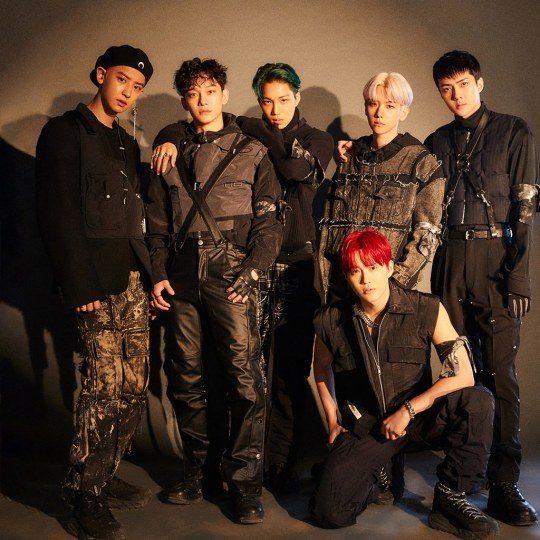
Chances are, even if you didn’t know it at the time, you’ve seen the members of the legendary K-Pop group EXO before. Their musical prowess speaks for itself, but even beyond that, their careers have taken over TV, fashion, celebrity culture, and more in the past year.
Maybe you've seen rapper and multi-instrumentalist Chanyeol, 27, shaking hands with Zendaya at Paris Fashion Week. Or perhaps it was breathtaking dancer and rapper Kai, 25, cracking 7th place on British GQ’s Best-Dressed Men of 2020 list. Or singer and composer Lay, 28, becoming Calvin Klein’s first-ever Chinese global ambassador. You might’ve watched rapper and youngest member Sehun, 25, on Netflix’s detective program Busted, or glimpsed leader and vocalist Suho, 28, waving from the red carpet as an honorary ambassador of the International Film Festival & Awards Macao. These are just a few of the places and memories that stamp the proverbial passport of EXO’s lives this year.
It’s been an equally powerful year musically for EXO too. With two members — Xiumin, 29, and D.O., 26, — currently completing their mandatory military enlistment and Lay promoting in China, the remaining six members of EXO have explored their own individual musical identities in 2019. Power vocalist Chen, 27, released two solo albums that chronicled love and heartbreak through mature, heart-warming ballads, while Baekhyun’s groovy solo album, City Lights, broke the highest monthly sales record for a solo artist in South Korean chart history with over 500,000 copies sold. Sehun and Chanyeol teamed up this summer for the debut of EXO-SC, EXO’s hip-hop sub-unit, while Baekhyun and Kai joined forces to “jump and pop” in SM supergroup SuperM.
As Chen tells Teen Vogue, this year has been “a time for EXO to reflect” on their past, present, and future as they reunite to promote their sixth album Obsession.
It’s December 4th, 2019, and the six members are dressed in thick, woollen, neutral-toned sweaters and trenchcoats to protect themselves from the arctic winds billowing throughout Seoul. There’s a warm camaraderie to their interactions as they laugh amongst themselves and take sips of their iced coffees. The atmosphere feels comfortable and familial, born from an understanding of each other’s mindsets and quirks that has been learned organically over the group’s career.
“It’s been seven years since we debuted and we’ll be hitting eight years next year; that’s a long period of time,” Chen says. His humble, calm demeanor is a balm for the rest of the group who cling to his introspective thoughts. “We reflected on our past journey and tried to make improvements in this new album. It’s been a grateful and fun time.”
This desire to continuously push boundaries both musically and creatively has been at the crux of EXO’s identity since their debut in 2012. Originally split into two groups, EXO-K and EXO-M, EXO performed their shared discography in both Korean and Mandarin in an effort to appeal to two major music markets simultaneously. The groups came together in 2013 to release their debut album, XOXO, and the album’s repackage released later in the year saw EXO’s popularity hit a fever pitch with the funky, dance-pop single “Growl.” Since then, each of EXO’s last five albums have sold over a million copies in South Korea alone, earning them the title “quintuple million sellers.”
The group is not only a staple in South Korea but across the globe too. From performing in front of the world at the closing ceremony of the 2018 Winter Olympics to becoming the first K-Pop group to have their faces projected on the Burj Khalifa in Dubai, EXO has stamped their name in the annals of pop history with their devotion toward their music, fans (called EXO-L), and each other. As they’ve matured over the years, that dedication hasn’t wavered.
“In our early years we just played together, whereas now we’ve grown up and matured,” Baekhyun replies. The singer’s personality is brighter than his shining white hair, and he thrives on the reactions to the jokes he makes throughout our chat. “We share a lot about where we’re headed in life, what we want to do for the upcoming album, and discuss how we can come together closer as a team to improve our teamwork.”
That tight-knit teamwork manifested itself in multiple ways throughout this year. From congratulating each other on Instagram like Lay did for Baekhyun’s solo debut to Xiumin and Sehun emceeing Chen’s solo album press conferences, the members have made it a point to support one another with every milestone they achieve, both individually and as a group. It also took center stage as the group embarked on their fifth world tour, Exo Planet #5 – The EXplOration, this July.
Part of the decision to go on tour, according to Suho, is because it makes the fans “happy,” which in turn makes EXO happy; this treasured time spent with fans also one of the reasons why the group worked tirelessly to release their new record in between their jam-packed personal schedules.
“Since the year EXO debuted, we’ve released an album every year. We’ve never skipped a single year,” Suho answers. With attention-grabbing ruby red hair, the leader holds himself with a quiet confidence and classic charm. “Even though it wasn’t a formal promise we made, it’s been a tradition to release an album each year, even if that means we have to make the promotion period short. Everyone’s been having hectic schedules, but it’s very meaningful for us to spend the end of the year with the fans.”

Heavily rooted in the group’s constant state of reinvention, the concept for Obsession sees EXO face off against their evil, superpowered doppelgängers X-EXO. Superpowers have been a common thread that has tied EXO’s music video multiverse together since their debut single “MAMA”, with each member utilizing their own signature power ranging from Chanyeol’s pyrokinesis to Kai’s teleportation abilities. When X-EXO arrives ready to destroy the planet in the group’s music video, the result is an explosive, superhero-style brawl between good and evil that leaves viewers enthralled.
In the lead up to shooting the music video, EXO emphasized the importance for both of their characters to have their own distinct, contrasting identity. While EXO dressed in weathered, straight laced black cargo pants and berets as if ready to march into war, X-EXO celebrated their eccentricities with jewel toned hair colors, white eyelashes, and uniquely cut clothing that bridged the gap between menacing and seductive.
“Our main focus was to draw a big contrast. All of us thoroughly discussed with our makeup and hair artists to bring that contrast, almost to the point of exaggeration,” Chanyeol says. He’s as jovial as his bubblegum pink hair and is openly expressive with his emotions, which light up his face whenever he speaks. “We tried to make X-EXO look very dark. EXO, on the other hand, was the good, righteous EXO like what fans have seen in the past. They came easy and naturally.”
“Like Chanyeol said, we discussed thoroughly with the makeup, hair, and costume team so that you could see the contrast right away,” Kai continues. Conscientious and thoughtful, Kai surveys the older members before answering so he doesn’t interrupt them. “Our attitudes also play a key role because they add to the strong visuals. Since it was a video, we all tried to make our performances convincing. X-EXO showed something that EXO had never done before — something mischievous.”
Amongst the members, X-EXO wins in a landslide over the team they liked the most.
“X-EXO had a stronger visual impact,” Baekhyun explains. “Personally, I wish that we made the plain EXO look cooler. That would have been right, because EXO was supposed to be the revolutionary army against X-EXO! I feel like they were visually weaker; I wish we had expressed more passion as EXO.”
With every album, EXO releases a bold title track that shatters the current K-pop paradigm, like the sinister “Obsession” or the reggae, EDM hybrid track “Ko Ko Bop." The remainder of the tracks on the albums typically allow EXO to explore new genres and make them their own, which range from hip-hop dance tracks like “Ya Ya Ya”, which samples ‘90s vocal trio SWV’s “You’re The One”, to heart-fluttering ballads like “Butterfly Effect."
Kai’s favorite track on the album is “Jekyll," which he loved from the first listen. “It starts off like a sweet R&B song, but the chorus suddenly changes into this shouting, which I think is in line with the duality expressed in the album,” he says. “I immediately thought that we could show a very different type of performance for this song — I can’t wait to perform this on stage and show the fans.”
“I like “Obsession” the most,” Sehun answers. Although under the weather, he makes a point to attend the interview to support his older members. “It was good enough to make the title track, so it’s my favorite.”
Chen picks the dreamy “Groove” because: “I love all the other tracks, but this song made me wonder if I could pull it off when I first heard it because it was such a different genre. It was challenging while recording it, but I love the result. It’s one of the songs that I feel most attached to.”
Chanyeol also fell in love with “Jekyll”, but is also partial to the similarly haunting reggae track “Trouble”. “The song came out to be great; I think we pulled it off pretty well,” he says happily.
“‘Day After Day’ for me,” says Baekhyun. While the other members have been discussing their favorites, he’s been silently exchanging silver rings with Suho. He nicks Chanyeol’s wire-rimmed glasses and puts them up his face backwards, reveling in the laughter he receives. “The song reminds me of a certain type of weather. I like songs that remind me of something — a song with a theme or story. ‘Day After Day’ does that for me.”
“I was going to say the same,” Suho says, shocked. A mischievous grin spreads on Baekhyun’s face. “Stop it,” he teases.
The room is whipped into uncontrollable laughter as Suho jokingly grasps the collar of Baekhyun’s sweater, as if he’s about to wrestle the other singer mid-interview. Suho’s faux fury only makes Baekhyun’s smile grow wider and he lets out a loud ahh, ahh! before Suho lets go.
“It reminds me of rain!” Suho complains, but a smile is working its way across his face too. “That’s because the lyrics have the word ‘rain’ in them,” Baekhyun dryly quips. “Choose something other than ‘Day After Day’,” Kai urges in between laughs. “Day after tomorrow? Two days after tomorrow?” The laughter doubles.
In the end, Suho chooses “Baby You Are." “The song uses band sounds and I really like the sound of the guitar,” he answers, before replying in English: “The intro is the best!” He flashes an assured smile and gives a thumbs up to further prove his point.
“The intro is your part!” Chen lovingly chides. “It’s because you sang that part!”
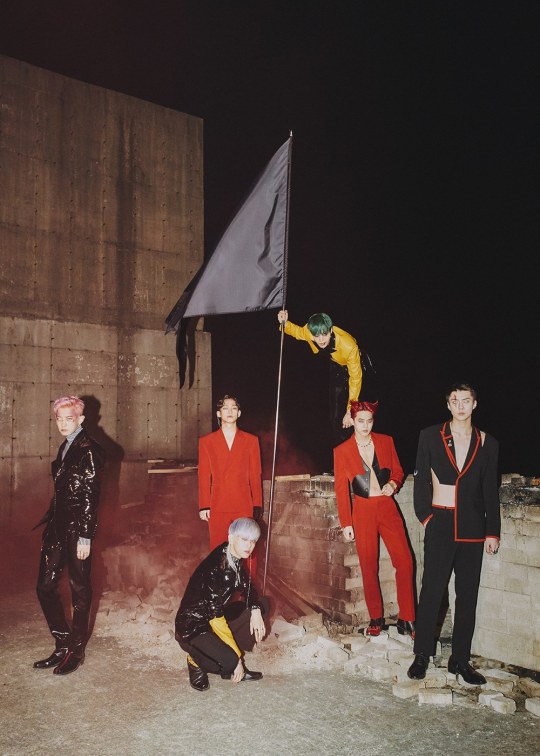
The most emotional track on the album is “Butterfly Effect," which is a direct callback to the group’s 2013 song “Don’t Go” (which literally translates to “Butterfly Girl”). The song, according to Chanyeol, was selected as a way to thank fans for their unwavering support over the last seven years.
“After viewing the different universes portrayed in EXO’s albums, you’ll be able to see a connection between Obsession and our previous records,” Chanyeol says. “In songs like ‘Don't Go’ and ‘Butterfly Effect’, there are butterflies that resist the Red Force [the canonical evil force mentioned throughout EXO’s music videos] and protect EXO. To us, these butterflies represent our fans, who are always beside us no matter what. They are why and how we exist.”
He continues: “Because of our fans — through their love and support — we are able to overcome any difficulties [we face as a group]. This is probably one of the biggest messages that we wanted to share on this album.”
Prior to their debut seven years ago, the members’ goals for the future were heavily built upon their dream to debut together. Chanyeol recalls that, before they were ever officially called EXO, each member was bonded together by a “common goal to create good music as one” as well as their frequent discussions while training to “work together for a very long time."
“At the time of our debut, we had achieved nothing and everything was up in the air. We talked about working together for a long time, hitting number one on the chart, winning awards, and more,” Kai replies, tone contemplative as he leans closer. “Personally speaking, when we eventually achieved all those goals, I realized, yes, winning awards and being successful is important, but more importantly being able to perform happily as an artist is what mattered the most. There were times when I obsessed over our sales record, stages, and something tangible, but now my goal and dream is to be a happy artist, being satisfied with what I do.”
At the end of Kai’s answer, EXO breaks out into a hearty round of applause. Kai bashfully shines on the encouragement with a soft grin. “He’s like a supervisor,” Baekhyun teases. Chanyeol concurs, “He’s like a CEO!”
Looking ahead, EXO’s goals for the upcoming year aren’t the grandiose, tangible achievements of their youth, but rather to keep the promise they made to each other all those years ago: to make music together for a really long time. “I’m wishing all the members’ health and happiness [in the future],” Chen says.
“Being able to perform for a long time as one, being able to meet the fans for a long time…” Kai reflects. “That’s the most important.”
source: emlyn travis @ Teen Vogue
261 notes
·
View notes
Text
[INTERVIEW] EXO - 191220 Teen Vogue: K-Pop Stars EXO Reflect on How Far They've Come — and How Far They'll Go
"As Chen tells Teen Vogue, this year has been “a time for EXO to reflect” on their past, present, and future.
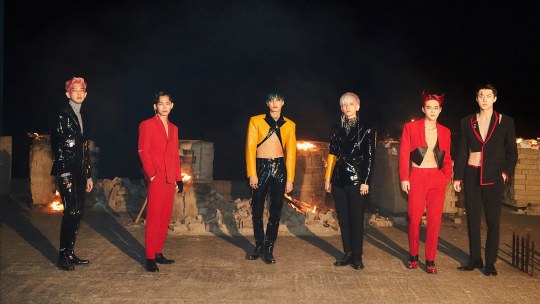
Chances are, even if you didn’t know it at the time, you’ve seen the members of the legendary K-Pop group EXO before. Their musical prowess speaks for itself, but even beyond that, their careers have taken over TV, fashion, celebrity culture, and more in the past year.
Maybe you've seen rapper and multi-instrumentalist Chanyeol, 27, shaking hands with Zendaya at Paris Fashion Week. Or perhaps it was breathtaking dancer and rapper Kai, 25, cracking 7th place on British GQ’s Best-Dressed Men of 2020 list. Or singer and composer Lay, 28, becoming Calvin Klein’s first-ever Chinese global ambassador. You might’ve watched rapper and youngest member Sehun, 25, on Netflix’s detective program Busted, or glimpsed leader and vocalist Suho, 28, waving from the red carpet as an honorary ambassador of the International Film Festival & Awards Macao. These are just a few of the places and memories that stamp the proverbial passport of EXO’s lives this year.
It’s been an equally powerful year musically for EXO too. With two members — Xiumin, 29, and D.O., 26, — currently completing their mandatory military enlistment and Lay promoting in China, the remaining six members of EXO have explored their own individual musical identities in 2019. Power vocalist Chen, 27, released two solo albums that chronicled love and heartbreak through mature, heart-warming ballads, while Baekhyun’s groovy solo album, City Lights, broke the highest monthly sales record for a solo artist in South Korean chart history with over 500,000 copies sold. Sehun and Chanyeol teamed up this summer for the debut of EXO-SC, EXO’s hip-hop sub-unit, while Baekhyun and Kai joined forces to “jump and pop” in SM supergroup SuperM.
As Chen tells Teen Vogue, this year has been “a time for EXO to reflect” on their past, present, and future as they reunite to promote their sixth album Obsession.
It’s December 4th, 2019, and the six members are dressed in thick, woollen, neutral-toned sweaters and trenchcoats to protect themselves from the arctic winds billowing throughout Seoul. There’s a warm camaraderie to their interactions as they laugh amongst themselves and take sips of their iced coffees. The atmosphere feels comfortable and familial, born from an understanding of each other’s mindsets and quirks that has been learned organically over the group’s career.
“It’s been seven years since we debuted and we’ll be hitting eight years next year; that’s a long period of time,” Chen says. His humble, calm demeanor is a balm for the rest of the group who cling to his introspective thoughts. “We reflected on our past journey and tried to make improvements in this new album. It’s been a grateful and fun time.”
This desire to continuously push boundaries both musically and creatively has been at the crux of EXO’s identity since their debut in 2012. Originally split into two groups, EXO-K and EXO-M, EXO performed their shared discography in both Korean and Mandarin in an effort to appeal to two major music markets simultaneously. The groups came together in 2013 to release their debut album, XOXO, and the album’s repackage released later in the year saw EXO’s popularity hit a fever pitch with the funky, dance-pop single “Growl.” Since then, each of EXO’s last five albums have sold over a million copies in South Korea alone, earning them the title “quintuple million sellers.”
The group is not only a staple in South Korea but across the globe too. From performing in front of the world at the closing ceremony of the 2018 Winter Olympics to becoming the first K-Pop group to have their faces projected on the Burj Khalifa in Dubai, EXO has stamped their name in the annals of pop history with their devotion toward their music, fans (called EXO-L), and each other. As they’ve matured over the years, that dedication hasn’t wavered.
“In our early years we just played together, whereas now we’ve grown up and matured,” Baekhyun replies. The singer’s personality is brighter than his shining white hair, and he thrives on the reactions to the jokes he makes throughout our chat. “We share a lot about where we’re headed in life, what we want to do for the upcoming album, and discuss how we can come together closer as a team to improve our teamwork.”
That tight-knit teamwork manifested itself in multiple ways throughout this year. From congratulating each other on Instagram like Lay did for Baekhyun’s solo debut to Xiumin and Sehun emceeing Chen’s solo album press conferences, the members have made it a point to support one another with every milestone they achieve, both individually and as a group. It also took center stage as the group embarked on their fifth world tour, Exo Planet #5 – The EXplOration, this July.
Part of the decision to go on tour, according to Suho, is because it makes the fans “happy,” which in turn makes EXO happy; this treasured time spent with fans also one of the reasons why the group worked tirelessly to release their new record in between their jam-packed personal schedules.
“Since the year EXO debuted, we’ve released an album every year. We’ve never skipped a single year,” Suho answers. With attention-grabbing ruby red hair, the leader holds himself with a quiet confidence and classic charm. “Even though it wasn’t a formal promise we made, it’s been a tradition to release an album each year, even if that means we have to make the promotion period short. Everyone’s been having hectic schedules, but it’s very meaningful for us to spend the end of the year with the fans.”
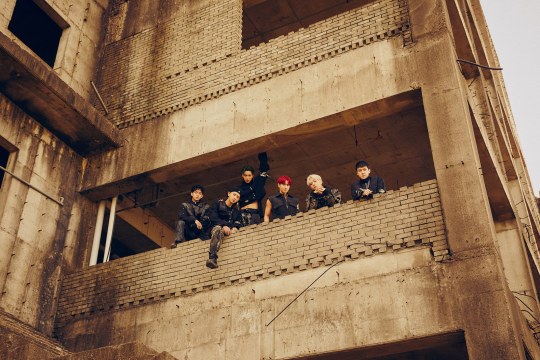
Heavily rooted in the group’s constant state of reinvention, the concept for Obsession sees EXO face off against their evil, superpowered doppelgängers X-EXO. Superpowers have been a common thread that has tied EXO’s music video multiverse together since their debut single “MAMA”, with each member utilizing their own signature power ranging from Chanyeol’s pyrokinesis to Kai’s teleportation abilities. When X-EXO arrives ready to destroy the planet in the group’s music video, the result is an explosive, superhero-style brawl between good and evil that leaves viewers enthralled.
In the lead up to shooting the music video, EXO emphasized the importance for both of their characters to have their own distinct, contrasting identity. While EXO dressed in weathered, straight laced black cargo pants and berets as if ready to march into war, X-EXO celebrated their eccentricities with jewel toned hair colors, white eyelashes, and uniquely cut clothing that bridged the gap between menacing and seductive.
“Our main focus was to draw a big contrast. All of us thoroughly discussed with our makeup and hair artists to bring that contrast, almost to the point of exaggeration,” Chanyeol says. He’s as jovial as his bubblegum pink hair and is openly expressive with his emotions, which light up his face whenever he speaks. “We tried to make X-EXO look very dark. EXO, on the other hand, was the good, righteous EXO like what fans have seen in the past. They came easy and naturally.”
“Like Chanyeol said, we discussed thoroughly with the makeup, hair, and costume team so that you could see the contrast right away,” Kai continues. Conscientious and thoughtful, Kai surveys the older members before answering so he doesn’t interrupt them. “Our attitudes also play a key role because they add to the strong visuals. Since it was a video, we all tried to make our performances convincing. X-EXO showed something that EXO had never done before — something mischievous.”
Amongst the members, X-EXO wins in a landslide over the team they liked the most.
“X-EXO had a stronger visual impact,” Baekhyun explains. “Personally, I wish that we made the plain EXO look cooler. That would have been right, because EXO was supposed to be the revolutionary army against X-EXO! I feel like they were visually weaker; I wish we had expressed more passion as EXO.”
With every album, EXO releases a bold title track that shatters the current K-pop paradigm, like the sinister “Obsession” or the reggae, EDM hybrid track “Ko Ko Bop." The remainder of the tracks on the albums typically allow EXO to explore new genres and make them their own, which range from hip-hop dance tracks like “Ya Ya Ya”, which samples ‘90s vocal trio SWV’s “You’re The One”, to heart-fluttering ballads like “Butterfly Effect."
Kai’s favorite track on the album is “Jekyll," which he loved from the first listen. “It starts off like a sweet R&B song, but the chorus suddenly changes into this shouting, which I think is in line with the duality expressed in the album,” he says. “I immediately thought that we could show a very different type of performance for this song — I can’t wait to perform this on stage and show the fans.”
“I like “Obsession” the most,” Sehun answers. Although under the weather, he makes a point to attend the interview to support his older members. “It was good enough to make the title track, so it’s my favorite.”
Chen picks the dreamy “Groove” because: “I love all the other tracks, but this song made me wonder if I could pull it off when I first heard it because it was such a different genre. It was challenging while recording it, but I love the result. It’s one of the songs that I feel most attached to.”
Chanyeol also fell in love with “Jekyll”, but is also partial to the similarly haunting reggae track “Trouble”. “The song came out to be great; I think we pulled it off pretty well,” he says happily.
“‘Day After Day’ for me,” says Baekhyun. While the other members have been discussing their favorites, he’s been silently exchanging silver rings with Suho. He nicks Chanyeol’s wire-rimmed glasses and puts them up his face backwards, reveling in the laughter he receives. “The song reminds me of a certain type of weather. I like songs that remind me of something — a song with a theme or story. ‘Day After Day’ does that for me.”
“I was going to say the same,” Suho says, shocked. A mischievous grin spreads on Baekhyun’s face. “Stop it,” he teases.
The room is whipped into uncontrollable laughter as Suho jokingly grasps the collar of Baekhyun’s sweater, as if he’s about to wrestle the other singer mid-interview. Suho’s faux fury only makes Baekhyun’s smile grow wider and he lets out a loud ahh, ahh! before Suho lets go.
“It reminds me of rain!” Suho complains, but a smile is working its way across his face too. “That’s because the lyrics have the word ‘rain’ in them,” Baekhyun dryly quips. “Choose something other than ‘Day After Day’,” Kai urges in between laughs. “Day after tomorrow? Two days after tomorrow?” The laughter doubles.
In the end, Suho chooses “Baby You Are." “The song uses band sounds and I really like the sound of the guitar,” he answers, before replying in English: “The intro is the best!” He flashes an assured smile and gives a thumbs up to further prove his point.
“The intro is your part!” Chen lovingly chides. “It’s because you sang that part!”
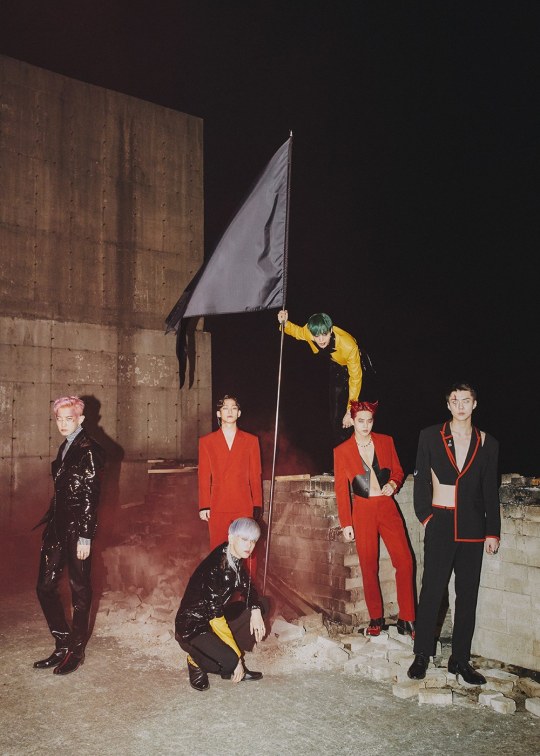
The most emotional track on the album is “Butterfly Effect," which is a direct callback to the group’s 2013 song “Don’t Go” (which literally translates to “Butterfly Girl”). The song, according to Chanyeol, was selected as a way to thank fans for their unwavering support over the last seven years.
“After viewing the different universes portrayed in EXO’s albums, you’ll be able to see a connection between Obsession and our previous records,” Chanyeol says. “In songs like ‘Don't Go’ and ‘Butterfly Effect’, there are butterflies that resist the Red Force [the canonical evil force mentioned throughout EXO’s music videos] and protect EXO. To us, these butterflies represent our fans, who are always beside us no matter what. They are why and how we exist.”
He continues: “Because of our fans — through their love and support — we are able to overcome any difficulties [we face as a group]. This is probably one of the biggest messages that we wanted to share on this album.”
Prior to their debut seven years ago, the members’ goals for the future were heavily built upon their dream to debut together. Chanyeol recalls that, before they were ever officially called EXO, each member was bonded together by a “common goal to create good music as one” as well as their frequent discussions while training to “work together for a very long time."
“At the time of our debut, we had achieved nothing and everything was up in the air. We talked about working together for a long time, hitting number one on the chart, winning awards, and more,” Kai replies, tone contemplative as he leans closer. “Personally speaking, when we eventually achieved all those goals, I realized, yes, winning awards and being successful is important, but more importantly being able to perform happily as an artist is what mattered the most. There were times when I obsessed over our sales record, stages, and something tangible, but now my goal and dream is to be a happy artist, being satisfied with what I do.”
At the end of Kai’s answer, EXO breaks out into a hearty round of applause. Kai bashfully shines on the encouragement with a soft grin. “He’s like a supervisor,” Baekhyun teases. Chanyeol concurs, “He’s like a CEO!”
Looking ahead, EXO’s goals for the upcoming year aren’t the grandiose, tangible achievements of their youth, but rather to keep the promise they made to each other all those years ago: to make music together for a really long time. “I’m wishing all the members’ health and happiness [in the future],” Chen says.
“Being able to perform for a long time as one, being able to meet the fans for a long time…” Kai reflects. “That’s the most important.”"
Photo links: 1, 2, 3
Credit: Teen Vogue.
175 notes
·
View notes
Text
Evanston Folk Fest Saturday: 9/7, Dawes Park
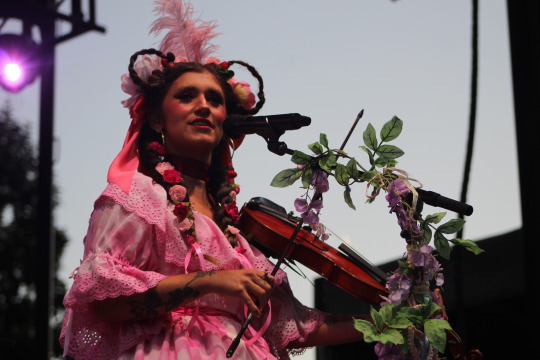
Sierra Ferrell
BY JORDAN MAINZER
Every musician I watched on Saturday at the Evanston Folk Fest grappled with, directly or indirectly, what folk music means in 2024. I knew going in, given the prestige of the musical lineup and speakers in the interview tent, that the festival would not be one that casts off "folk" as a mere aesthetic, visual or instrumental. Indeed, even if many of the booked musicians didn't fit the general schema of the folk genre, they abided by its most important tenet: music not just by the people but for the people, independent of level of expertise.
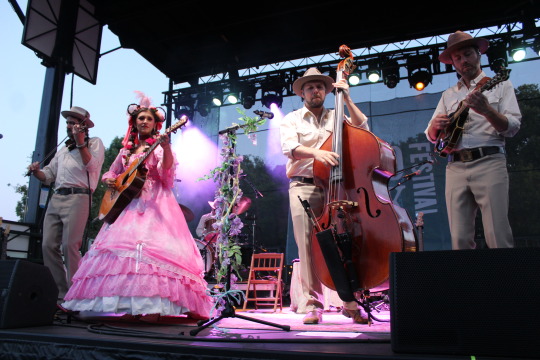
From left to right: Oliver Bates Craven, Ferrell, Matty Meyer, Geoff Saunders, & Joshua Rilko
Headlining the night was Sierra Ferrell, a singer-songwriter from West Virginia whose unique mix of bluegrass and Latin-influenced arrangements (and, yes, wild outfits) have allowed her to garner steadily increasing crossover appeal beyond her initial viral rise. Earlier this year, she released her fourth studio album Trail of Flowers (Rounder), which managed to widen the spectrum of her sound while emphasizing--let alone not losing--her idiosyncrasies. On standout fiddle jam "I Could Drive You Crazy"--Ferrell's proclaimed greatest relationship skill--you can hear crowd chatter from a show she did on a previous New Year's Eve. Such noise was almost perfectly replicated on Saturday, as Ferrell's band (multi-instrumentalist Oliver Bates Craven, mandolinist Joshua Rilko, bassist Geoff Saunders, drummer Matty Meyer) led off with the song's melody to welcome her onto the stage. As she waltzed on, revealing her poofy pink dress and feathered-and-flowered hair, done up like an Appalachian Björk, her fans did indeed hoot and holler.
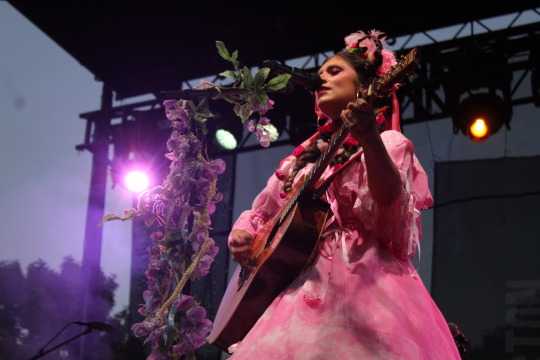
Ferrell
Likewise, no matter the studio sheen of Trail of Flowers (or "Fox Hunt" being thumping enough to soundtrack an NFL cut to commercial), live, its songs fit seamlessly into a set that seemed intimate despite the large crowd. Album opener "American Dreaming" has found a second life as a song to be played near the end of the show, a crowd singalong due to its catchy melody and commonly felt story of a person unable to sit still. For touring musician Ferrell, who started out as train-hopping, van-dwelling, busking nomad, the only difference now is she can better afford nightly lodging. When performing, her unmistakably raspy voice takes even sharper twists and turns: During "Chittlin' Cookin' Time in Cheatham County", she occupied the shrillness of Joanna Newsom, flutters of Josephine Foster, and barroom gurgle of Tom Waits from moment to moment. Later, during Kris Kristofferson's "Me and Bobby McGee", but in the style of its most famous iteration by Janis Joplin, you half-expected Ferrell to do a Joplin impression. She has the skills, but instead, she made it her own, a true folk singer who can sing a song from the collective consciousness, but not showy enough to discourage others from joining in.

Rilko
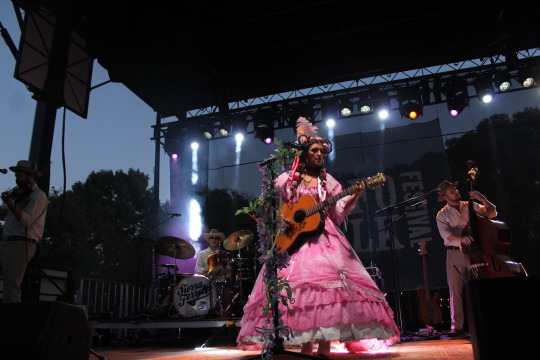
Craven, Meyer, Farrell, & Saunders

Craven, Meyer, Farrell, Saunders, & Rilko

Hiss Golden Messenger

Hiss Golden Messenger
Midway through his solo set, Hiss Golden Messenger's MC Taylor let the crowd know he was going to do a cover of a folk song. "I was a folklorist in my former life, so I feel qualified to play it," he quipped. The song was Grateful Dead's "Bertha", and it received such rapturous applause that Taylor joked he should have led off with it. First, Taylor's always qualified to play Dead songs. His venerable band has been interpolating "Franklin's Tower" into Lateness of Dancers bop "Lucia" for years, and he's beginning to release live recordings on his Bandcamp page at the pace of a certain band that was oft-bootlegged. More importantly, though, at this point, Hiss Golden Messenger has developed a catalog of contemporary folk classics. As soon as Taylor came on stage, introduced by Evanston mayor Daniel Biss, an eager crowd member requested "Sanctuary", to which a chuffed Taylor requested patience, replying, "We'll get there!" As Hiss Golden Messenger studio songs and full-band performances expand in length and sound, they always sound good stripped down, too, from newer tunes like "Shinbone" to favorites like "Biloxi". Of course, it's the biggest treat to hear songs from acoustic masterpiece Bad Debt, an album he'll play in full next month at SPACE. Taylor gave the Evanston Folk Fest crowd a preview of what's to come with "Balthazar's Song", a tune that could make you melt on the coldest day of the year.

Hiss Golden Messenger

Hiss Golden Messenger
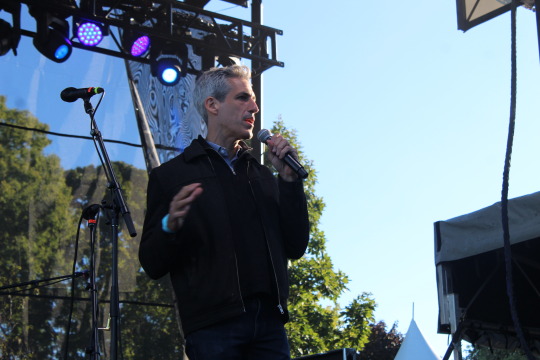
Mayor of Evanston, Daniel Biss

Willi Carlisle
And then there was the artist who, perhaps expectedly, most reckoned with the idea of what folk music means, Arkansas-based singer-songwriter Willi Carlisle. Sure, some of it was tongue-in-cheek, asking what an upper-middle-class Chicago suburb was doing deciding what constitutes a folk festival, but for the most part, Carlisle framed folk music as being in constant battle with that which represents an existential threat to, well, regular folks: capitalism, empire, and the patriarchy. Carlisle is a captivating storyteller and musician, reciting his poetry at a breakneck pace and ad-libbing, too, switching between banjo, fiddle, guitar, and a capella. I'm glad he's released a taste of what his shows are like with Tales From Critterland (Signature Sounds), which features three of the many songs he played on Saturday, plus their proper introductions: "The Arrangements", inspired by and dedicated to his and all bad fathers, "Critterland", which came from his attempt to live in an intentional community, and Steve Goodman's "The Ballad of Penny Evans". It was that last one that was the song of the day on Saturday, perfect for time and place. Let's acknowledge the elephant in the room: Goodman's best known in Chicago for writing the song that plays at Wrigley Field after the Cubs win. The crowd at Evanston Folk Fest was likely more familiar than is the average Chicagoan with Goodman's penchant for writing incredibly moving and righteous songs, but for those who weren't, Carlisle's show-stopping version of Goodman's anti-Vietnam War ballad surely gave them the chills. On Tales From Critterland, Carlisle explains how Goodman lifted the melody from a song about slavery, sung from the point of view of the slaveowner, repurposing a great melody for a song with complete opposite levels of morality, an exercise in the evolution of songs. On Saturday, Carlisle simply dedicated his performance to all the Palestinians murdered by a despotic Israeli government. It was a moment that most spoke to folk music's true power, that of "This machine kills fascists" protest, an ability to foresee unfortunately everlasting societal ills, and a dare to hope for a better world.

Carlisle
#live music#evanston folk festival#sierra ferrell#oliver bates craven#matty meyer#hiss golden messenger#daniel biss#space#willi carlisle#signature sounds#trail of flowers#geoff saunders#joshua rilko#rounder#rounder records#joanna newsom#josephine foster#tom waits#kris kristofferson#janis joplin#mc taylor#grateful dead#lateness of dancers#bad debt#tales from critterland#signature sounds recording inc.#steve goodman#wrigley field#chicago cubs#evanston folk fest
1 note
·
View note